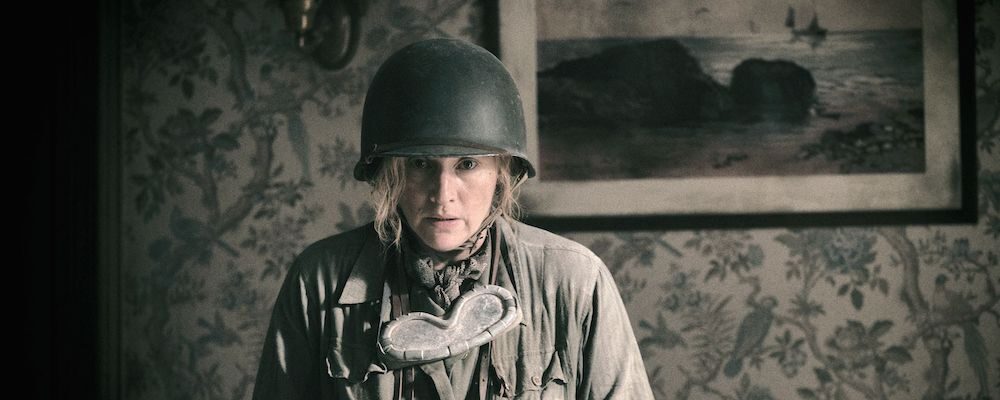‘Lee’: Kate Winslet Embodies WWII Photojournalist Lee Miller in Fascinating True Story
Sandra Miska
Many of us have seen the provocative image of American photographer Lee Miller bathing in Adolf Hitler’s bathtub, but few know about the woman herself or the journey that led her to the German dictator’s abandoned Munich apartment at the end of World War II. Kate Winslet and director Ellen Kuras fill in the blanks in “Lee,” a compelling story of the model-turned-photographer, who, through grit and determination, found herself in the trenches of WWII, becoming one of the few American women to witness the array of atrocities committed by the Nazis up close.
“Lee” is not the first film Winslet and Kuras have worked on together, as the latter was an accomplished cinematographer before she turned to directing, most notably on “Eternal Sunshine of the Spotless Mind.” Her background helps her paint a nuanced portrait of Lee, who herself believes that when you take one’s picture, you are stealing a part of them. Miller, who has a haunted past, sees things through her lens that are not visible to the naked eye. Winslet brilliantly captures Miller’s inner turmoil as she maintains the necessary emotional distance from her subjects that is needed to properly bear witness with her camera.
The main plot is framed by an interview of Lee Miller in her home in the English countryside in 1977, conducted by a young journalist (Josh O’Connor). A flashback to the days leading up to the war show her living a carefree artist’s life in Paris with her friends, including French fashion editor and noblewoman Solange d’Ayen (Marion Cotillard), and artist Nusch Éluard (Noémie Merlant). Her modeling days now behind her, Miller spends her time indulging in the three things she claims to do best, “drinking, taking photos and having sex.” Two pivotal events send her down a more focused course. First, she meets her future husband, Roland Penrose (Alexander Skarsgård), an artist from an aristocratic background. Then there is the onset of World War II, which she first sees through newsroll footage with her friends. In the beginning, the conflict feels far away from them, and they have a hard time believing that so many are following Hitler and his hateful rhetoric.
Miller, who for sometime has wanted something more from life, feels a call to action and ends up at the London offices of Vogue asking for a photojournalist position. Editor Audrey Withers (Andrea Riseborough) hires her as a war photographer, and she starts by taking photos of the Blitz in London. Soon, she feels a pull to go to the frontline, and this is where her tenacity really kicks in. After being rejected by the British government, she turns to the American government to get accredited as an official war correspondent. It is not surprising to learn that her gender limits her movements, but it is bewildering when she is told by an Army official that women are not even allowed in press briefings. She initially works her way around this rule by disguising herself as a man.
Soon, Miller teams up with David Scherman (Andy Samberg), a fellow American and photographer for Life Magazine. When Samberg, best known for his comedic work, first appears, one might be understandably weary, but he ends up delivering a solid performance. Together, they witness the liberation of France from Nazi occupation. During this time, they learn of the Nazis rounding up Jewish people and others from persecuted groups. The lingering question of where these folks went is never far from Miller’s thoughts. They could not have just disappeared into thin air, right? Her curiosity leads her to Germany, and to this film’s most memorable and emotionally impactful scenes.
“Lee” is a must-watch, not only because it delivers another award-worthy performance from Winslet, but, more significantly, because it reminds us of the importance of bearing witness. While some in power felt the public should be shielded from the horrors of the war, Miller recognized the power of the stories told in her photographs. “Lee” also reminds those of us who might feel aimless or unfocused at a certain point in life, that we can all make an impact if we put ourselves out there during dark days.
“Lee” releases Sept. 27 in theaters nationwide.

